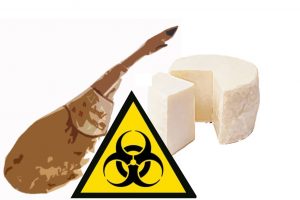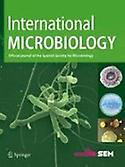 Today, Friday, July 2, we have had a second session on Food Microbiology, with very interesting presentations. Among them, highlighting that of Dr. Félix Núñez, from the University of Extremadura. He has put in context the incidence of a mycotoxin present in food, the ocratoxina A, a toxin produced by several species of molds that can contaminate food, releasing these toxins that pass into the food chain. According to reports from the European Food Safety Agency (EFSA), meat products are the most contaminated by this mycotoxin, which is very worrying and classified as a possible carcinogen. In his presentation, he has shown us some very promising results from the research carried out by his group, based on combining other molds that can intervene on the molds that produce ochratoxin A. A first fungus is Penicillium chrysogenum, which has been shown to compete with toxigenic molds for nutrients, disrupt the cell wall, and repress mycotoxin-producing genes. In addition, this fungus produces a protein (PgAFP) that, in addition to altering the mold wall, also produces oxidative stress, causing the death of the toxic fungi. Another investigated fungus has been Debaryomyces hansenii, which is also involved in gene expression for ochratoxin A, in this case through volatile and soluble metabolites. Conclusion, these fungi could be used as protective cultures for toxic molds during the processing of meat products and thus inhibit their proliferation and their production of ochratoxin A.
Today, Friday, July 2, we have had a second session on Food Microbiology, with very interesting presentations. Among them, highlighting that of Dr. Félix Núñez, from the University of Extremadura. He has put in context the incidence of a mycotoxin present in food, the ocratoxina A, a toxin produced by several species of molds that can contaminate food, releasing these toxins that pass into the food chain. According to reports from the European Food Safety Agency (EFSA), meat products are the most contaminated by this mycotoxin, which is very worrying and classified as a possible carcinogen. In his presentation, he has shown us some very promising results from the research carried out by his group, based on combining other molds that can intervene on the molds that produce ochratoxin A. A first fungus is Penicillium chrysogenum, which has been shown to compete with toxigenic molds for nutrients, disrupt the cell wall, and repress mycotoxin-producing genes. In addition, this fungus produces a protein (PgAFP) that, in addition to altering the mold wall, also produces oxidative stress, causing the death of the toxic fungi. Another investigated fungus has been Debaryomyces hansenii, which is also involved in gene expression for ochratoxin A, in this case through volatile and soluble metabolites. Conclusion, these fungi could be used as protective cultures for toxic molds during the processing of meat products and thus inhibit their proliferation and their production of ochratoxin A.
Another conference has been carried out by Dr. Juan José Córdoba, also from the University of Extremadura. On this occasion he has illustrated us with the investigations that are being carried out to control Listeria monocytogenes in ready-to-eat matured foods, such as sausages and cheeses, where the presence of the bacteria is relatively frequent. According to the latest EFSA report, in Europe there have been more than 2,600 reported cases of listeriosis with a lethality of 17%. His talk has been divided into three sections. First he introduced us improvements in the detection of bacteria contaminations in the food industry: multiplex qPCR techniques aimed at detecting virulent serotypes, combined with pulsed field genomic techniques. In second place, more efficient processes to eradicate the bacteria, such as the use of high pressures and other procedures based on accelerated electrons in sliced meat products. Finally, other procedures based on the microbial competition in the ripening process using Lactobacillus you said 205 . The inoculation of this lactobacillus in the meat product did not change the organoleptic conditions of the sausage and significantly reduced the amount of Listeria compared to uninoculated controls.
Summary by Dolo Vidal and Magdalena Martínez Cañamero





No comment yet, add your voice below!